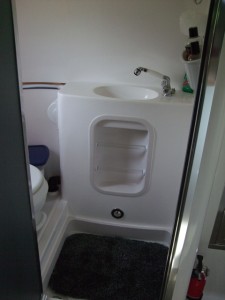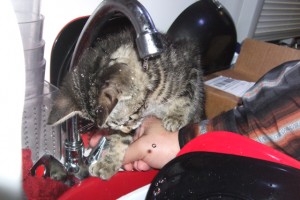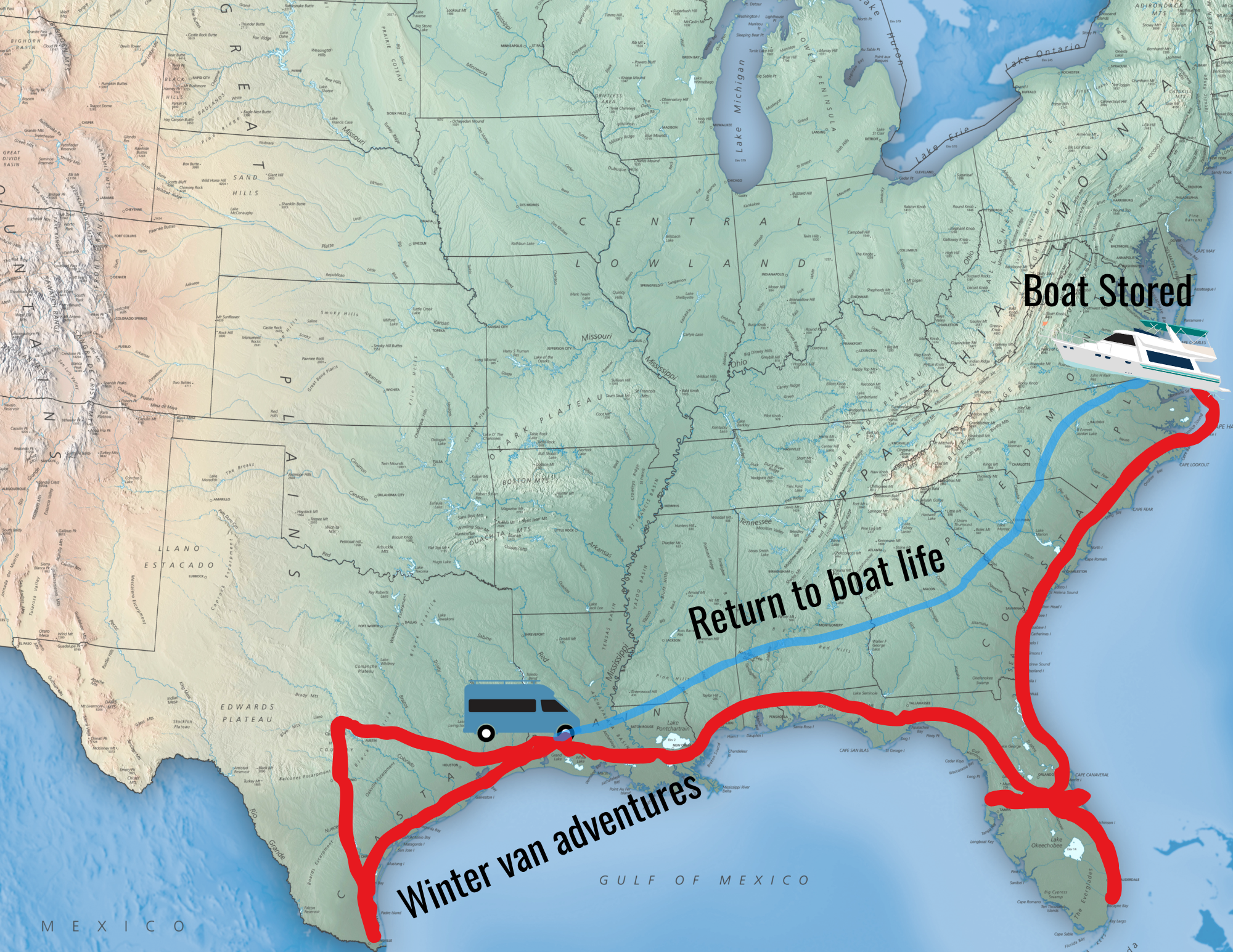There’s some pretty major family stuff up in our lives that is taking our focus, so please excuse our absence from posting much recently and in the coming weeks. We’ll update on that when more is known, but for now – I’m reposting something we did on water conseveration from before this blog was as widely read. Perhaps it will help instill confidence that you don’t have to use as much water as you think you do… Enjoy!
On board the Oliver, we have a fresh water tank that is 32.5 gallons, plus a hot water heater that holds an additional 6 gallons. Our grey water tank (which holds sink and shower dirty water) is 35.5 gallons and our black water (potty waste) is 18.5 gallons. The tank sizes, for the size of trailer we have, are actually quite large.
But obviously, 38.5 gallons of fresh water is not a huge amount either. When I lived in a traditional house, it was quite likely I used this much water for a single shower. For someone going to an off-grid event like Burning Man, they may do the math and say — wow, that’s 19 days worth of water! No problem.
Here’s how we conserve water when we’re living off-grid for extended periods of time:
Showers
Showers can easily account for most of our water usage. Obviously, you’re not going to be able to stand under hot flowing water for several minutes with this type of lifestyle.. at least, not often. I’ve gotten quite adept at taking a fulfilling 1-2 gallon shower. I turn on the water (usually capturing the initial cold water coming out of the tap into a jug to use for drinking water and/or toilet flushing later), give myself a good rinsing and then.. and here’s the big secret.. turn off the water! Our shower faucet has a quick button for turing the water on and off, while keeping the temperature settings intact. This makes it extra easy to not let the water flow when it doesn’t need to be.
 I lather up with a little bath gel, not using anything other than my hands (as a rag, loofah or scrubby would take lots of extra water to rinse out). If I’m in the mood, I may shave my legs at this point. And then I rinse.
I lather up with a little bath gel, not using anything other than my hands (as a rag, loofah or scrubby would take lots of extra water to rinse out). If I’m in the mood, I may shave my legs at this point. And then I rinse.
That’s it.
Notice I don’t shampoo my hair. I’ve actually not shampooed my hair since October 2007, and instead using a baking soda/apple cider vinegar routine once a week or so. Occasionally I will use a conditioner if I’m in a dry climate. My hair feels much more healthy than it ever did, and it really reduces my water needs, hygiene costs and environmental impact.
And when we’re in motion or living off grid, it’s not unusual for us to take a shower once every 2 or 3 days. We utilize Burning Man bathing (baby wipes) quite often, and use just enough water to wet my hair to comb through it. And the reality is, once I get past about 36 hour mark after my last shower, it’s quite natural feeling. I think here in America, we’ve gotten quite spoiled with our hygiene routines — you can look and smell great without taking a daily long steamy shower.
That’s not to say, that when the opportunity presents itself — I do indulge in a nice 3-5 minute long hot shower at a friend’s house or campground . It feels like downright luxury when it happens.
Dishwashing
One of our tricks with dishwashing was following the advice of boating nomads I know. We got a dishpan that fits perfectly in our sink, and use that to do dishes in. And when in places where it’s allowed, we can then dump the greywater directly onto the ground instead of it going into our tank.
The dishpan makes it really obvious just how much water is being used. Again, the trick here is to turn off the water when not rinsing. We’ll often use paper towels to clean food debris off the plates as much as possible, rinse, spray sudsy water and then rinse again. A spray bottle with diluted dishsoap is extra helpful in conserving water and quickly applying soapy water. When needing to really conserve water, we’ll re-use rinse water for the initial rinse of the next dish. We’ve been able to do an entire load of dishes (which for us is usually a wok, two plates, two forks and two cups) with about 2 cups of water.
And of course, cooking with minimal dishes being made in the process is also key. I do most of my cooking with a single wok. And I try to avoid dishes that require boiling (such as noodles/rice) when we don’t have ample access to water. Avoiding dishes that leave behind a mess is also critical.
Teeth brushing / hand washing
Other big water users are brushing teeth and washing hands. The teeth brushing comes down to the very first water conservation lesson I remember having in the 3rd grade — turn off the water (notice this re-occurring theme). Hand washing is difficult because we don’t have on demand hot water (our heater is usually off, as we run it off propane most times — and it’s easy to waste a 1/2 gallon of water getting hot water out of the tap). For hand washing, we often combine cold water rinsing with sanitizing gel.
So how long do we last between dumping grey/black tanks and refilling fresh water? It’s been quite variable depending on what we’re doing. We’ve done Burning Man twice for 10-11 days with tank room and fresh water to spare (but were evaporating some of our grey water, and using the porta-potties). We’ve stayed 2-4 weeks in one location without access to a dump station, and did fine with supplementing using a real bathroom for part of that. I’d say in general — a week to two is easy to do without much thought. And we can eek out more when needed.
Any other tips for saving water when living off-grid?



Cool tips, I use some of em, not the apple cider vinegar/baking soda thing, that’s new to me (will check it out).
I’d ad on: (don’t be afraid to use a natural water source (pond, river, stream, etc) for some things).
*often you can boon-dock near a natural water source, dip some h20 into a cool empty resealable plastic coffee container (or 2) and use that to flush your toilet (saving your valued fresh potable water in your tanks for other needs). (Also handy to wash the rig with, often in boondocking locations there is no one around to give you grief about that kind of stuff.)
*I have rigged an outdoor shower on the Oyster Can (great for rinsing off after the beach), but note: some places don’t allow shower water on the ground.
If I do pass a potable water source on my bike or scooter (even if I’m not near my rig), I may just fill up a water jug or 2 when I go by and pour it into my fresh water system.
I too use the sink dish pan trick, and turn off the water.
.-= travelfables´s last blog ..Adventures in New Orleans and the French Quarter: =-.
My daughter asked why you would need to rinse the soap from a “rag, loofah or scrubby” if you are just going to soap it again next time?
.-= Linda Sand´s last blog ..Bryce Canyon National Park =-.
The idea of washing my body with a musky smelling dirty rag/loofah is highly unappealing to me. And in a small space (our shower is about 4 sq ft), I wouldn’t want the wet soapy mesh hanging around.
I use about 4 oz of water in a cup to brush my teeth. Dip the toothbrush in, add paste and brush, rinse with a couple mouthfulls from the cup, then rinse the toothbrush in the remaining water. I learned this tent camping as a kid about 50 years ago. 🙂
.-= Linda Sand´s last blog ..Blister! =-.
One of the things we do that seems to save us a lot is to re-use the dishwater and hand washing water. We use a basin in the sink like you, but when it’s a bit more than a quarter full, that’s just the right amount of water to flush the toilet with. This helps in two ways… our fresh water tank lasts longer because it isn’t being used for the toilet, and we don’t fill the gray tank as much because most of it now goes in the black tank when flushing.
.-= Jonathan´s last blog ..Hunting The Hunters =-.
Hope your family is okay!
Lots of good tips here; thanks!
Did you know that, according to a 2005 report, “Hot water for hand washing has not been proved to remove germs better than cold water.” This was news to me when I read about in the NY Times a couple months ago, here: http://www.nytimes.com/2009/10/13/health/13real.html
One theory says that we tend to wash our hands longer in hot/warm water because it is more comfortable, but it is the length of time spent washing that counts, not the temperature. And all that time scrubbing works fine with the water turned off.
We have hot water recirculating valves on our bus, but I don’t use them any longer for hand washing unless the water is REALLY cold. And I no longer feel less clean washing my hands in cold water taps at, say, rest areas or parks.
So, you can probably skip the step of using hand sanitizer after cold water hand washing!
.-= Louise´s last blog ..Crossroads of the West =-.
Glad to hear you do ok at BM with those tank sizes. They’re pretty similar to ours and we’re a bit concerned about the grey water. I hope everything’s well and we’re looking forward to seeing you at Camp Nomadia!
Please, tell me more about the “baking soda/apple cider vinegar routine”. That might come in handy while boondocking in the desert next winter.
.-= Linda Sand´s last blog ..Mountain Road—Take me Home =-.
Hi Linda..
The link in the article links to my full post about the no-poo routine – https://www.technomadia.com/2009/07/two-years-shampoo-free/
Thanks!
We’ve been practicing with some of these tips at home. We can get lazy with water if not paying attention, because we don’t even pay for water in out building. We have been trying to cut all things back both for conservation issues as well as to prepare us for smaller living on the road (or sea, if that ever works out 😉 )
.-= James Schipper´s last blog ..4 Ways to Watch Lemonade Movie — Sequel Update! =-.